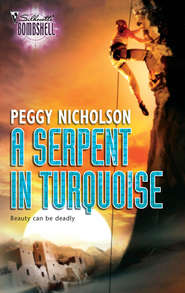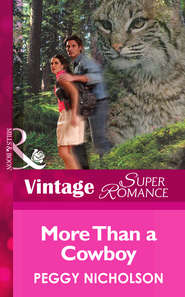По всем вопросам обращайтесь на: info@litportal.ru
(©) 2003-2024.
✖
A Serpent In Turquoise
Настройки чтения
Размер шрифта
Высота строк
Поля
“No. He said that Cade was aboard, but that he was too busy to see me.”
“Maybe he was lying? Maybe Cade was asleep, or—”
“Nobody could have slept through that warning. And most of his crew was hanging over the rails of the platform, whistling and cheering, by the time I sailed in at its base. Somebody was bound to tell Cade that a woman was sailing around out there.” And he’d have known it was me. “No, Jaye, I finally got the message. That was a brush-off.”
“So did you punch Muscles in the nose, and ask him to please pass that on?”
“Tempted, but no. He was doing his best to arrange my transportation to anywhere in the world I wished to go. I could have the use of the rig’s chopper, with a transfer to the company jet. Or he’d take me ashore himself, in a crew boat. I could have anything I wanted.” Except access to Cade.
“So, did you take him up on his offer?”
“Are you kidding? I stomped back to my surfboard and sailed back to the dhow.” Cade’s bodyguard had idled along behind her in a crashboat, till he’d seen her safely aboard. And if anything convinced her that he was acting under Kincade’s direct orders, it was that final courtesy. Cade telling her by proxy that he cared for her.
But it was over. Now she blinked rapidly in the gathering dusk and swung to stare at the chains of red taillights, which miraculously had begun to move.
Home at last—or as near as Raine had to a home these days. The top floor of an old brownstone in the West Eighties, with fresh flowers in every room, and a bar of chocolate on her pillow. The welcoming touches came thanks to Eric Bradley, the freelance writer who lived on the floor below and traded office space in the seldom-used apartment for occasional concierge duties.
His fat orange tomcat came swarming up the fire escape as soon as he heard footsteps overhead. Strolling in from the balcony through the open French windows, Otto leaped to the desk and sat down on the heap of mail waiting there. Ignoring both women, he spit-washed his cheeks and nose, then he tongued his left shoulder.
“I met a lion in the Blue Mountains that had better manners than you,” Raine told him, “and a better figure, too.”
“Don’t let’s discuss figures, if we’re ordering pizza.” Jaye reached for the phone book. “I’ll do that, if you want to shower. Barbecue chicken and pineapple, with onions?”
“Yum. And there were a few bottles of Chianti under the kitchen counter when I left. If nobody has guzzled it all…”
The apartment served as a pied-à-terre for any member of the footloose clan who might be passing through the city. Their father and his twin brother had bought the place some forty years ago, long before the neighborhood had become fashionable, while they’d been working at the nearby Museum of Natural History.
“Still here,” Jaye called with her head in the cabinet. “Now go get that shower.”
When Raine returned, combing her damp hair, she wore a blue Indonesian block-print sarong. Cade had bought it for her in Borneo. She’d hesitated now before choosing it, then she’d made a face and slipped it around her bare body. Just because a man had barged into her heart, then wandered out again, she was damned if she’d mourn. Life was too short for that. Carpe diem was the family motto. Seize the day, seize the opportunity, seize the dinosaur, cherish every pleasure. Paleontological fieldwork was one of the most dangerous careers in the world, right up there with test pilots and smoke jumpers. If you lived on the edge, then you learned to savor each moment as if it were your last. You couldn’t do that looking wistfully over your shoulder at what might have been.
“Another twenty minutes till the pizza,” Jaye reported, handing her a glass of wine. She returned to the desk where she’d been sorting the mail, to tug another piece out from under the cat. “Not much here beyond the usual junk. We missed an opening at the Smithsonian last month: fossilized ferns.” She handed that over and drew out a long, smudged letter from beneath its furry paperweight. Jaye studied the return address printed on its backside. “Who do we know in Mexico?”
“Beats me. Maybe it’s for Trey?” The expediter for Ashaway All was an ex-SEAL, probably also an ex-mercenary. In his dubious travels to unspecified places, he’d collected a raffish circle of friends and contacts. But mail for Trey usually went to Ashaway headquarters in Grand Junction, Colorado.
Jaye reversed the envelope. “Nope. It’s for you, care of National Geographic.”
“Oh?” Raine ripped it open, drew out a single sheet of rather grubby paper and read aloud. “‘Dear Ms. Ashaway. Don’t know if anyone’s ever asked you this before, but if you’ll glance at the enclosed photo of the temple of Quetzalcoatl at Teotihuacan—could the stone faces there with the snouts that stick out—be depictions of some kind of dinosaur?’”
She exchanged a glance with Jaye and they burst out laughing. “Another kid.”
Since Raine’s discovery of the world’s only known specimen of a fire opal Tyrannosaurus rex, then its subsequent sale at Sotheby’s auction house for fifty-seven million dollars, she’d been getting loads of letters from strangers. Most of her correspondents were male; most of them were under the age of twelve. Each was bursting to tell her his latest theory about the coloration or speed or near-human IQ of T rex. Or he was writing to volunteer, offering to drive her Land Rover and tote her rifle on her next bone-hunting expedition.
Or he wanted to send her what he was firmly convinced was a dinosaur fossil—no matter what his dad said about it being just a dirty old cow bone—if she’d promise to put it up for auction at Sotheby’s, then send him a million dollars when it sold.
Raine could sympathize with dreamers, even when she couldn’t oblige them in their schemes. She was a hunter and a dreamer and a schemer herself. So she lifted the photo in question and studied it with an indulgent sigh.
Gradually her brows drew together. She reached past Otto for a magnifying glass. She could see what the writer meant. He’d sent a close-up shot of a decorative frieze, carved along the top rim of what seemed to be a large rectangular temple. It showed a repeating motif of a grotesque stone face that seemed vaguely human, alternating with the sculpted head of an animal with a spiked neck-frill and a massive, beaky muzzle. If one stretched one’s imagination, added in the missing nose horn and discounted a bit of artistic license on the part of the carver, the creature did look…
“He’s not entirely nuts,” she said, passing the photo to Jaye. “This does look like a cousin of Triceratops, maybe crossed with Styracosaurus.” Not a known ceratopid, but some species yet to be discovered.
And, of course, that was what every Ashaway of Ashaway All, the world’s foremost fossil supply house, lived to discover. New species of dinosaurs.
“So what’s he proposing?” Jaye murmured whimsically. “That the Aztecs hung out with dinosaurs?” Triceratops had vanished from this earth at the end of the Cretaceous Period, some 65 million years before the Aztecs’ forebears strolled across the Bering Strait land bridge, then drifted south in search of sunnier real estate.
“Don’t know.” Raine resumed reading. “‘And if you do see a resemblance, then here’s a second question for you. Is there any place in Mexico or the southwestern USA where the fossil bones of this sort of dinosaur might be common? Where an Aztec might have uncovered one?’ Ah, so that’s what he’d been getting at!” Dinosaurs were usually discovered when their bones were exposed by erosion of wind or water, a geologic process that would have been at work a thousand years ago, as well as today. “So he figures that some Aztec stumbled upon a dino skull, extrapolated what the live beast would look like, declared him a god—then carved his portrait all around the sides of this temple?”
“Aztec dinosaurs! Now I’ve heard everything.” Jaye jumped as the downstairs buzzer announced the arrival of their pizza. “Back in a flash.”
Raine studied the signature at the bottom of the page. A flourishing, angular, indubitably male signature. Too bold and quirky for a twelve-year-old. “Professor Anson McCord,” she murmured as she deciphered it. Nobody she’d ever heard of, but she could picture him. He’d be one of her juvenile dino-lovers grown large. Dry and dusty from years of academic pondering and pontificating. Horn-rim glasses hiding blinky blue eyes, and freckles galore. He’d be gangly as Ichabod Crane, earnest in the extreme. Not a professor of paleontology, or he wouldn’t need to ask her about his “dinosaur.”
A history prof, she’d bet, afflicted with a lingering case of his boyhood bone-fever. Probably he’d taken a vacation to Mexico City, toured the temple at nearby Teotihuacan and been thunderstruck with the daring and originality of his own theory, which he now desperately needed to share with a kindred soul. She resumed reading, If you have any useful thoughts on this, I’d sure like to hear ’em, he’d written in closing. I collect my mail at the address below, whenever I come to town.
“Magdalena’s Cantina in Mipopo?” The bar’s address placed it in the northwest of mainland Mexico, somewhere in the state of Chihuahua. Raine chose an atlas from one of a dozen that were wedged into the nearest overcrowded bookshelf. It took her magnifying glass to find the dot that was Mipopo. A speck of a town along a rim of the—“Barrancas del Cobre” Raine murmured aloud, savoring the words like music on the tongue. So the professor was poking around the Copper Canyons, one of the last truly wild regions in North America.
Looking for Triceratops. Or possibly for Aztecs. Which, come to think of it, must be just about as extinct as dodos and dinosaurs. Raine laughed softly and closed the atlas. She’d always had a weakness for academic eccentrics.
They ate out on the narrow balcony that overlooked the backyard gardens and balconies of the adjoining block. While they talked idly of family and friends, a candle burned on the table between them. “So what now?” Jaye asked when there was nothing left but the wine.
“I’m not sure. With Ethiopia on hold, my calendar’s empty.” Not good. She and her siblings were close, but the way their father and uncle had structured Ashaway All, the top earner in any year got first claim on operational funds in the following year to finance his or her next expedition. The others had to trim their sails and their projects accordingly. It was a tough but fair system that kept them all hustling. Unfortunately Ethiopia had been all out-go, with no resulting income. Raine sighed.
“You could help me and my guys while you’re figuring it out.” Jaye was excavating for prehistoric amber in the Pine Barrens of southern New Jersey. Most of her field crew were interns from Princeton. “Fastest way to forget about Kincade is to surround yourself with a pack of flirtatious, adorable, Ivy League hotties. Beefcake and brains is a treat to behold.”
Raine snorted. “You’re not poaching in the playpen, are you?”
“No, just waving back at ’em through the bars. That’s thrill enough. And I do have a couple of grad students old enough to grow beards. Plus their professors cruise through whenever they get the urge to take off their ties and muck in the dirt.”
“Sounds like you’ve got plenty of company already.” Raine yawned, stretched, stared up at the night sky. Not a star to be seen; the city lights had banished every one. She was restless already. And this was no time to sit and brood. Miles and motion were what she needed right now.
That and something exciting—something wonderful—to chase. If by any miracle Professor McCord wasn’t entirely a crackpot…If he’d seen some old bones, or heard of some… “I appreciate the offer, Jaye. But I’m thinking maybe I’ll fly down for a few days and check out the Copper Canyons.”
Chapter 2
M ipopo didn’t qualify as a town, in Raine’s estimation. It was a squalid little crossroads, set back a quarter mile from the canyon’s awesome rim, as if its original founders had feared it might grow dizzy and tip over. Its main street had a general store with a battered gas pump out front, perhaps a dozen ancient adobes still standing. The only inhabitants in sight were several discouraged dogs and a flock of optimistic chickens pecking the rutted road.
And if there was a bar in town, they were hiding it pretty well. Maybe the professor had made it all up? “When in doubt, ask,” she muttered, swerving in to stop alongside the gas pump.
The ancient proprietor limped out to fill the tank on her topless Jeep, then wash her bug-splattered windshield. But when it came to directions, he was a man of few words. Make that one. “Que?”
“La Cantina de Magdalena,” Raine repeated in careful Spanish. “Could you tell me where it is?”
“Que?” Raising his voice, he smiled wide enough to show her his steel eye-tooth.
“Magdalena’s bar?” Raine tried in English. Or maybe ‘what’ was all the Spanish he spoke, since that was the secondary language in these parts.
The Copper Canyons were home to the Tarahumara Indians, second largest tribe of native Americans in the northern hemisphere. According to the guidebook Raine had bought this morning in Creel, it took a linguist about twelve years to learn their language—if he had an exceptional ear. “What about a place to stay for the night?” she tried without much hope, as she settled behind the wheel of her Jeep.
She folded her hands, prayer-fashion, pressed them to one ear and cocked her head. Closing her eyes, she sighed blissfully, as if snuggling down into a comfy pillow.
“Maybe he was lying? Maybe Cade was asleep, or—”
“Nobody could have slept through that warning. And most of his crew was hanging over the rails of the platform, whistling and cheering, by the time I sailed in at its base. Somebody was bound to tell Cade that a woman was sailing around out there.” And he’d have known it was me. “No, Jaye, I finally got the message. That was a brush-off.”
“So did you punch Muscles in the nose, and ask him to please pass that on?”
“Tempted, but no. He was doing his best to arrange my transportation to anywhere in the world I wished to go. I could have the use of the rig’s chopper, with a transfer to the company jet. Or he’d take me ashore himself, in a crew boat. I could have anything I wanted.” Except access to Cade.
“So, did you take him up on his offer?”
“Are you kidding? I stomped back to my surfboard and sailed back to the dhow.” Cade’s bodyguard had idled along behind her in a crashboat, till he’d seen her safely aboard. And if anything convinced her that he was acting under Kincade’s direct orders, it was that final courtesy. Cade telling her by proxy that he cared for her.
But it was over. Now she blinked rapidly in the gathering dusk and swung to stare at the chains of red taillights, which miraculously had begun to move.
Home at last—or as near as Raine had to a home these days. The top floor of an old brownstone in the West Eighties, with fresh flowers in every room, and a bar of chocolate on her pillow. The welcoming touches came thanks to Eric Bradley, the freelance writer who lived on the floor below and traded office space in the seldom-used apartment for occasional concierge duties.
His fat orange tomcat came swarming up the fire escape as soon as he heard footsteps overhead. Strolling in from the balcony through the open French windows, Otto leaped to the desk and sat down on the heap of mail waiting there. Ignoring both women, he spit-washed his cheeks and nose, then he tongued his left shoulder.
“I met a lion in the Blue Mountains that had better manners than you,” Raine told him, “and a better figure, too.”
“Don’t let’s discuss figures, if we’re ordering pizza.” Jaye reached for the phone book. “I’ll do that, if you want to shower. Barbecue chicken and pineapple, with onions?”
“Yum. And there were a few bottles of Chianti under the kitchen counter when I left. If nobody has guzzled it all…”
The apartment served as a pied-à-terre for any member of the footloose clan who might be passing through the city. Their father and his twin brother had bought the place some forty years ago, long before the neighborhood had become fashionable, while they’d been working at the nearby Museum of Natural History.
“Still here,” Jaye called with her head in the cabinet. “Now go get that shower.”
When Raine returned, combing her damp hair, she wore a blue Indonesian block-print sarong. Cade had bought it for her in Borneo. She’d hesitated now before choosing it, then she’d made a face and slipped it around her bare body. Just because a man had barged into her heart, then wandered out again, she was damned if she’d mourn. Life was too short for that. Carpe diem was the family motto. Seize the day, seize the opportunity, seize the dinosaur, cherish every pleasure. Paleontological fieldwork was one of the most dangerous careers in the world, right up there with test pilots and smoke jumpers. If you lived on the edge, then you learned to savor each moment as if it were your last. You couldn’t do that looking wistfully over your shoulder at what might have been.
“Another twenty minutes till the pizza,” Jaye reported, handing her a glass of wine. She returned to the desk where she’d been sorting the mail, to tug another piece out from under the cat. “Not much here beyond the usual junk. We missed an opening at the Smithsonian last month: fossilized ferns.” She handed that over and drew out a long, smudged letter from beneath its furry paperweight. Jaye studied the return address printed on its backside. “Who do we know in Mexico?”
“Beats me. Maybe it’s for Trey?” The expediter for Ashaway All was an ex-SEAL, probably also an ex-mercenary. In his dubious travels to unspecified places, he’d collected a raffish circle of friends and contacts. But mail for Trey usually went to Ashaway headquarters in Grand Junction, Colorado.
Jaye reversed the envelope. “Nope. It’s for you, care of National Geographic.”
“Oh?” Raine ripped it open, drew out a single sheet of rather grubby paper and read aloud. “‘Dear Ms. Ashaway. Don’t know if anyone’s ever asked you this before, but if you’ll glance at the enclosed photo of the temple of Quetzalcoatl at Teotihuacan—could the stone faces there with the snouts that stick out—be depictions of some kind of dinosaur?’”
She exchanged a glance with Jaye and they burst out laughing. “Another kid.”
Since Raine’s discovery of the world’s only known specimen of a fire opal Tyrannosaurus rex, then its subsequent sale at Sotheby’s auction house for fifty-seven million dollars, she’d been getting loads of letters from strangers. Most of her correspondents were male; most of them were under the age of twelve. Each was bursting to tell her his latest theory about the coloration or speed or near-human IQ of T rex. Or he was writing to volunteer, offering to drive her Land Rover and tote her rifle on her next bone-hunting expedition.
Or he wanted to send her what he was firmly convinced was a dinosaur fossil—no matter what his dad said about it being just a dirty old cow bone—if she’d promise to put it up for auction at Sotheby’s, then send him a million dollars when it sold.
Raine could sympathize with dreamers, even when she couldn’t oblige them in their schemes. She was a hunter and a dreamer and a schemer herself. So she lifted the photo in question and studied it with an indulgent sigh.
Gradually her brows drew together. She reached past Otto for a magnifying glass. She could see what the writer meant. He’d sent a close-up shot of a decorative frieze, carved along the top rim of what seemed to be a large rectangular temple. It showed a repeating motif of a grotesque stone face that seemed vaguely human, alternating with the sculpted head of an animal with a spiked neck-frill and a massive, beaky muzzle. If one stretched one’s imagination, added in the missing nose horn and discounted a bit of artistic license on the part of the carver, the creature did look…
“He’s not entirely nuts,” she said, passing the photo to Jaye. “This does look like a cousin of Triceratops, maybe crossed with Styracosaurus.” Not a known ceratopid, but some species yet to be discovered.
And, of course, that was what every Ashaway of Ashaway All, the world’s foremost fossil supply house, lived to discover. New species of dinosaurs.
“So what’s he proposing?” Jaye murmured whimsically. “That the Aztecs hung out with dinosaurs?” Triceratops had vanished from this earth at the end of the Cretaceous Period, some 65 million years before the Aztecs’ forebears strolled across the Bering Strait land bridge, then drifted south in search of sunnier real estate.
“Don’t know.” Raine resumed reading. “‘And if you do see a resemblance, then here’s a second question for you. Is there any place in Mexico or the southwestern USA where the fossil bones of this sort of dinosaur might be common? Where an Aztec might have uncovered one?’ Ah, so that’s what he’d been getting at!” Dinosaurs were usually discovered when their bones were exposed by erosion of wind or water, a geologic process that would have been at work a thousand years ago, as well as today. “So he figures that some Aztec stumbled upon a dino skull, extrapolated what the live beast would look like, declared him a god—then carved his portrait all around the sides of this temple?”
“Aztec dinosaurs! Now I’ve heard everything.” Jaye jumped as the downstairs buzzer announced the arrival of their pizza. “Back in a flash.”
Raine studied the signature at the bottom of the page. A flourishing, angular, indubitably male signature. Too bold and quirky for a twelve-year-old. “Professor Anson McCord,” she murmured as she deciphered it. Nobody she’d ever heard of, but she could picture him. He’d be one of her juvenile dino-lovers grown large. Dry and dusty from years of academic pondering and pontificating. Horn-rim glasses hiding blinky blue eyes, and freckles galore. He’d be gangly as Ichabod Crane, earnest in the extreme. Not a professor of paleontology, or he wouldn’t need to ask her about his “dinosaur.”
A history prof, she’d bet, afflicted with a lingering case of his boyhood bone-fever. Probably he’d taken a vacation to Mexico City, toured the temple at nearby Teotihuacan and been thunderstruck with the daring and originality of his own theory, which he now desperately needed to share with a kindred soul. She resumed reading, If you have any useful thoughts on this, I’d sure like to hear ’em, he’d written in closing. I collect my mail at the address below, whenever I come to town.
“Magdalena’s Cantina in Mipopo?” The bar’s address placed it in the northwest of mainland Mexico, somewhere in the state of Chihuahua. Raine chose an atlas from one of a dozen that were wedged into the nearest overcrowded bookshelf. It took her magnifying glass to find the dot that was Mipopo. A speck of a town along a rim of the—“Barrancas del Cobre” Raine murmured aloud, savoring the words like music on the tongue. So the professor was poking around the Copper Canyons, one of the last truly wild regions in North America.
Looking for Triceratops. Or possibly for Aztecs. Which, come to think of it, must be just about as extinct as dodos and dinosaurs. Raine laughed softly and closed the atlas. She’d always had a weakness for academic eccentrics.
They ate out on the narrow balcony that overlooked the backyard gardens and balconies of the adjoining block. While they talked idly of family and friends, a candle burned on the table between them. “So what now?” Jaye asked when there was nothing left but the wine.
“I’m not sure. With Ethiopia on hold, my calendar’s empty.” Not good. She and her siblings were close, but the way their father and uncle had structured Ashaway All, the top earner in any year got first claim on operational funds in the following year to finance his or her next expedition. The others had to trim their sails and their projects accordingly. It was a tough but fair system that kept them all hustling. Unfortunately Ethiopia had been all out-go, with no resulting income. Raine sighed.
“You could help me and my guys while you’re figuring it out.” Jaye was excavating for prehistoric amber in the Pine Barrens of southern New Jersey. Most of her field crew were interns from Princeton. “Fastest way to forget about Kincade is to surround yourself with a pack of flirtatious, adorable, Ivy League hotties. Beefcake and brains is a treat to behold.”
Raine snorted. “You’re not poaching in the playpen, are you?”
“No, just waving back at ’em through the bars. That’s thrill enough. And I do have a couple of grad students old enough to grow beards. Plus their professors cruise through whenever they get the urge to take off their ties and muck in the dirt.”
“Sounds like you’ve got plenty of company already.” Raine yawned, stretched, stared up at the night sky. Not a star to be seen; the city lights had banished every one. She was restless already. And this was no time to sit and brood. Miles and motion were what she needed right now.
That and something exciting—something wonderful—to chase. If by any miracle Professor McCord wasn’t entirely a crackpot…If he’d seen some old bones, or heard of some… “I appreciate the offer, Jaye. But I’m thinking maybe I’ll fly down for a few days and check out the Copper Canyons.”
Chapter 2
M ipopo didn’t qualify as a town, in Raine’s estimation. It was a squalid little crossroads, set back a quarter mile from the canyon’s awesome rim, as if its original founders had feared it might grow dizzy and tip over. Its main street had a general store with a battered gas pump out front, perhaps a dozen ancient adobes still standing. The only inhabitants in sight were several discouraged dogs and a flock of optimistic chickens pecking the rutted road.
And if there was a bar in town, they were hiding it pretty well. Maybe the professor had made it all up? “When in doubt, ask,” she muttered, swerving in to stop alongside the gas pump.
The ancient proprietor limped out to fill the tank on her topless Jeep, then wash her bug-splattered windshield. But when it came to directions, he was a man of few words. Make that one. “Que?”
“La Cantina de Magdalena,” Raine repeated in careful Spanish. “Could you tell me where it is?”
“Que?” Raising his voice, he smiled wide enough to show her his steel eye-tooth.
“Magdalena’s bar?” Raine tried in English. Or maybe ‘what’ was all the Spanish he spoke, since that was the secondary language in these parts.
The Copper Canyons were home to the Tarahumara Indians, second largest tribe of native Americans in the northern hemisphere. According to the guidebook Raine had bought this morning in Creel, it took a linguist about twelve years to learn their language—if he had an exceptional ear. “What about a place to stay for the night?” she tried without much hope, as she settled behind the wheel of her Jeep.
She folded her hands, prayer-fashion, pressed them to one ear and cocked her head. Closing her eyes, she sighed blissfully, as if snuggling down into a comfy pillow.











